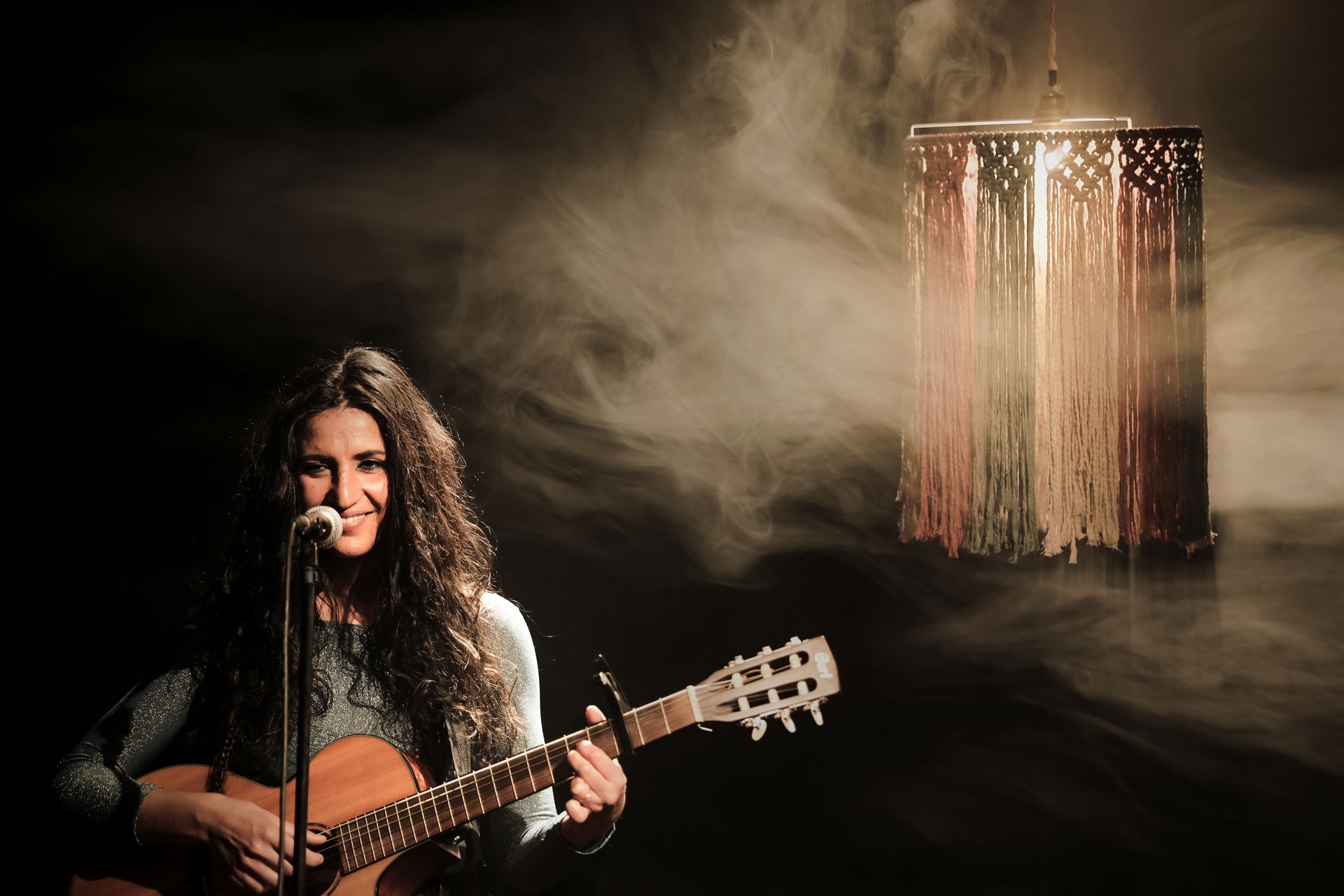It is “Leuca,” the solo debut of Salento singer Rachele Andrioli, released by Finisterre, the winning album of the National City of Loano Prize for Italian Traditional Music, the most prestigious award for traditional music in Italy, given annually to the best musical production in the folk sphere by a jury of more than fifty specialized journalists and scholars. “Leuca” also won the Youth Prize, reserved for female musicians under 35.
The nineteenth edition of the festival, scheduled for July 26-28, 2023, at Loano, thus confirms the Prize's focus on a new generation of performers who have been able to embrace the legacy of traditional musics, whether in dialect or minority languages, but who carry it forward in the context of new musical creativity.
“Rachele Andrioli's ‘double’ victory in Leuca does not catch us unprepared,‘ says artistic director Jacopo Tomatis, ’For years with the Loano Prize we have been supporting young musicians and young female musicians through original productions and ad hoc invitations, and among the records that have received the highest votes from our jury in recent editions are many artists of the ”new' generation. These are - like Rachele Andrioli - performers who grew up in the midst of the revival of world music in the 2000s, who rediscovered their traditions through their families or through the mediation of records and the Internet. In any case, they tell us of a new ferment around these musics in Italy, carried out with increasingly refined techniques and tools, with a lot of passion and without imposing philological or ideological limits on themselves anymore.".
“The National City of Loano Award,” say Loano Mayor Luca Lettieri and Cultural Councilor Enrica Rocca, "aims not only to reward the best folk productions of the last period or to pay proper tribute to those who, over the years, have established themselves as some of the best representatives of this particular genre, but it also aims to promote a type of music that is in the groove of our country's local customs and traditions. The rhythms, sounds, themes, even the instruments used are, in most cases, direct expressions of the music of our past. The Prize, therefore, has a very important historical and cultural value and represents an event with cross-cultural significance that helps to safeguard and hand down very important pages of Italian history. We would like to thank the organizers and the municipal offices involved in planning this event.".
Rachele Andrioli, a singer and percussionist born in 1989, is one of the most original interpreters of new music from Salento. In a career that began while still a teenager, she has shared the stage with musicians from Puglia and all over the world, from Officina Zoé, Giro di Banda and Tarantavirus (with Cesare dell'Anna) to Rocco Nigro, with whom she has released three albums (“Malìe,” 2014; “Maldimé,” 2015; “Maletiempu,” 2018), from Arto Lindsay and Piers Faccini to Baba Sissoko.
“Leuca,” produced by Erasmo Treglia for Finisterre and recorded by Valerio Durante, is his solo debut. Explained Andrioli in an interview with Guido Festinese for Music Journal, “Leuca is a feminine name. It is the name of the extreme cape of Puglia where I was born and live, it means ‘white,’ and it is not a color because it contains them all. Some say it was the color of dawn for the approaching ships, some the color of the sea foam on the cliffs.” The sounds on the record fuse the Apulian folk repertoire with new and different worlds, thanks in part to the collaboration of Redi Hasa on cello and the vocal ensemble Coro a Coro, founded by Andrioli herself and composed of more than 40 women from Salento. “Carrying on a tradition by being here and now, not in the past,” Andrioli says, "could be compared to a love relationship: it's something you have to work on steadily, in the present, to keep the flame burning.

In second place among the Award jury's top-rated albums is “Ἐρημία/Eremìa” (AlfaMusic/EGEA) by Calabrian Ettore Castagna. Musician, researcher, ethnomusicologist, writer, anthropologist, Castagna has traversed the last forty years of folk in Italy as a protagonist, first with Re Niliu and Nistanimèra and then with the Antiche Ferrovie Calabro-Lucane project, among many others. Ἐρημία/Eremìa sees him singing in Calabrian, Greek, and Arabic, between sounds of tradition and innovations. In third place, tied, Peppe Barra's “Cipria e caffè” (Aquadia Enjoy All Music/Soundfly/Self), a monumental summation of one of the greatest Neapolitan voices of the last half-century, and “Inghirios” (Sard'music/EGEA) by the Sardinian Le Balentes.
The City of Loano Prize for Italian Traditional Music was established nineteen years ago as a permanent workshop on folk music, and promotes and enhances contemporary production of traditional music with Italian roots through the involvement of artists, record labels, journalists and cultural workers. It is organized by the Compagnia dei Curiosi Association in collaboration with the Tourism and Culture Department of the City of Loano, and with the contribution of the Fondazione A. De Mari. Artistic direction is by Jacopo Tomatis, with the collaboration of Ciro De Rosa, Enrico de Angelis, Lucia Campana, Annalisa Scarsellini and Davide Valfrè.
Partners of the Loano Prize: Andrea Parodi Prize, Folkest.
The ranking of the Best Album Award 2022
1st place
Leuca (Finisterre) - Rachele Andrioli
2nd place
Ἐρημία/Eremìa (AlfaMusic/EGEA) Ettore Castagna
3rd place
Powder and Coffee (Aquadia Enjoy All Music/Soundfly/Self) Peppe Barra
Inghirios (Sard'music/EGEA) Le Balentes
5th place
Uauà - Tribute in Music to Eugenio Cirese (Squilibri) Giuseppe Moffa
6th place
996 - The Songs of G.G. Belli (La Tempesta Dischi/Squilibri) Ardecore
7th place
At the Roots of Song (Visage Music) Radicanto
8th place
Polaris (Italysona) Folkatomik
9th place
Maresia (Zero Nine Nine) Fabrizio Piepoli
Meuseucca servadze (Chrome Music) Teres Aoutes String Band feat. tatè Nsongan
The Award Jury
Maurizio Agamennone, Claudio Agostoni, Sergio Albertoni, Giovanni Alcaini, Riccardo Barone, Marco Boccitto, Raffaello Carabini, Pietro Carfì, Giordano Casiraghi, Daniele Cestellini, Gianni Ciaccio, Valerio Corzani, Giandomenico Curi, Enrico de Angelis, Flaviano De Luca, Ciro De Rosa, Paolo Del Ry, Enrico Deregibus, Salvatore Esposito, Antonio Fanelli, Gerardo Ferrara, Massimo Ferro, Guido Festinese, Simona Frasca, Jonathan Giustini, Ezio Guaitamacchi, Federico Guglielmi, Marco La Viola, Felice Liperi, Marco Lutzu, Ignazio Macchiarella, Giorgio Maimone, Maurizio Marino, Tiziano Menduto, Giorgio Meneghetti, Gaetano Menna, Marco Miconi, Gianni Montano, Anna Nacci, Giancarlo Nostrini, Rosario Pantaleo, Riccardo Piaggio, Massimo Pirotta, Massimo Poggini, Piercarlo Poggio, Ezio Riberi, Alessandro Rosa, Vincenzo Santoro, Annalisa Scarsellini, Stefano Starace, Jacopo Tomatis, Federico Vacalebre, Gianluca Veltri, John Vignola, Antonio Vivaldi, Enrico Zagnagnoli, Paolo Zara, Giorgio Zito

